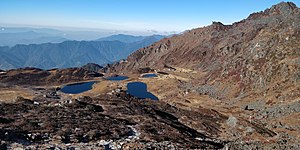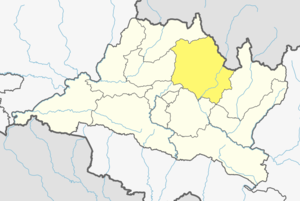Sindhupalchok District (or Sindhupalchok, Nepali: सिन्धुपाल्चोक जिल्ला [sindʱupalt͡sok] ) is a part of Bagmati Province and one of the seventy-seven districts of Nepal, with an area of 2,542 km2 (981 sq mi). The district's headquarters is in Chautara. In 2006, 336,478 people resided in 79 village development committees; in 2011 there were 287,798.[1]
Sindhupalchok District
सिन्धुपाल्चोक जिल्ला | |
|---|---|
 Panch Pokhari lakes | |
 Location of the district within Bagmati Province | |
| Coordinates: 27°46′N 85°42′E / 27.767°N 85.700°E | |
| Country | |
| Province | Bagmati Province |
| Admin HQ. | Chautara |
| Government | |
| • Type | Coordination committee |
| • Body | DCC, Sindhupalchok |
| Area | |
| • Total | 2,542 km2 (981 sq mi) |
| Highest elevation | 7,080 m (23,230 ft) |
| Lowest elevation | 300 m (1,000 ft) |
| Population (2011) | |
| • Total | 287,818 |
| • Density | 110/km2 (290/sq mi) |
| Time zone | UTC+05:45 (NPT) |
| Website | dccsindhupalchowk |
Geography
editThe climatic zones found in the district comprise:[2]
| Climate zone | Elevation range | % of area |
|---|---|---|
| Upper Tropical | 300 to 1,000 meters 1,000 to 3,300 ft. |
6.0% |
| Subtropical | 1,000 to 2,000 meters 3,300 to 6,600 ft. |
37.2% |
| Temperate | 2,000 to 3,000 meters 6,400 to 9,800 ft. |
24.5% |
| Subalpine | 3,000 to 4,000 meters 9,800 to 13,100 ft. |
15.1% |
| Alpine | 4,000 to 5,000 meters 13,100 to 16,400 ft. |
7.8% |
| Nival | above 5,000 meters | 9.1% |
Demographics
edit| Census year | Pop. | ±% p.a. | |
|---|---|---|---|
| 1981 | 232,326 | — | |
| 1991 | 261,025 | +1.17% | |
| 2001 | 305,857 | +1.60% | |
| 2011 | 287,798 | −0.61% | |
| 2021 | 262,852 | −0.90% | |
| |||
| Source: Citypopulation[3] | |||
At the time of the 2011 Nepal census, Sindhupalchowk District had a population of 287,798.
As their first language, 53.3% spoke Nepali, 32.7% Tamang, 5.9% Newari, 2.7% Sherpa, 1.7% Hyolmo/Yolmo, 1.2% Danuwar, 1.1% Thami, 0.3% Gurung, 0.2% Maithili,, 0.2% Majhi, 0.1% Magar, 0.1% Pahari, 0.1% Tibetan and 0.2% other languages.[4]
Ethnicity/caste: 34.4% were Tamang, 18.1% Chhetri, 11.1% Newar, 10.3% Hill Brahmin, 3.9% Kami, 3.6% Sanyasi/Dasnami, 2.6% Sherpa, 2.3% Majhi, 1.9% Damai/Dholi, 1.7% Magar, 1.7% Thami, 1.7% Yolmo, 1.5% Sarki, 1.3% Danuwar, 1.0% Gurung, 0.9% Gharti/Bhujel, 0.7% Pahari, 0.2% Ghale, 0.2% Thakuri, 0.1% Bhote, 0.1% foreigners, 0.1% Jirel and 0.3% others.[5]
Religion: 59.0% were Hindu, 38.0% Buddhist, 1.8% Christian, 1.1% Prakriti and 0.1% others.[6]
Literacy: 59.3% could read and write, 2.9% could only read and 37.7% could neither read nor write.[7]
Administration
editThe district consists of 12 local levels, out of which three are municipalities and nine are rural municipalities. These are as follows:[8]
- Chautara Sangachowkgadhi
- Bahrabise
- Melamchi
- Balephi Rural Municipality
- Sunkoshi Rural Municipality
- Indrawati Rural Municipality
- Jugal Rural Municipality
- Panchpokhari Thangpal Rural Municipality
- Bhotekoshi Rural Municipality
- Lisankhu Pakhar Rural Municipality
- Helambu Rural Municipality
- Tripurasundari Rural Municipality
Former towns and villages
editPrior to the restructuring of the district in January 2013,[9] the major towns were Khadichaur, Chautara, Bahrabise, Melamchi, Jalbire and Tatopani.
- Andheri
- Atarpur
- Badegau
- Bahrabise Municipality
- Bahunepati
- Balephi
- Bansbari
- Banskharka
- Baramchi
- Baruwa
- Batase
- Bhimtar
- Bhotang
- Bhote Namlang
- Bhotechaur
- Bhotsipa
- Binjel
- Chanaute
- Chautara Municipality
- Chehere Bazar
- Choukati
- Dhade
- Dhuskot
- Dubarchaur
- Gati
- Ghorthali
- Ghumthang
- Gloche
- Gumba
- Gunsakot
- Hagam
- Haibung
- Helambu
- Ichok
- Irkhu
- Jalbire
- Jethal
- Jyamire
- Kadambas
- Kalika
- Kalleri, Phulpingkot
- Karkhali
- Kattike
- Khadichaur
- Kiul
- Kunchok
- Lamosanghu
- Langarche
- Lisankhu
- Listikot
- Mahankal
- Manekharka
- Maneshwara
- Marming
- Melamchi Municipality
- Motang
- Mude
- Nawalpur
- Noubise
- Pagretar
- Palchok
- Pangtang
- Petaku
- Phatakshila
- Phulping Katti
- Phulpingdanda
- Phulpingkot
- Piskar
- Ramche
- Sangachok
- Selang
- Shildhunga
- Sikharpur
- Sikre Bazar
- Simpani-Kubinde
- Sindhukot
- Sipa Pokhare
- Sipal Kavre
- Sukute Bazar
- Sunkhani
- Syaule Bazar
- Talamarang
- Tatopani
- Tauthali
- Tekanpur
- Thakani
- Thampal Chhap
- Thangpalkot
- Thokarpa
- Thulo Dhading
- Thulo Pakhar
- Thulo Sirubari
- Thum Pakhar
- Timpul Ghyangul
- Yamanadanda
Education
editThere are more than half a dozen colleges offering bachelor's degrees in Sindhupalchok. More than 25 schools are running +2 level[clarify] programs. Chautara campus has just started science course at +2 level.[clarify] There are generally one or more high schools in each VDC within Sindhupalchok. Chautara Campus, Thokarpa Community Campus, Sunkoshi Campus, and Jalbire Valley Campus are some leading educational institutions. Higher-level education is only available in Chautara, Bahrabise, Kavre and Kathmandu.[citation needed]
There are more than 25 private schools in the district. These include Sadabahar Academy (established in 2063 BS), Ekta Boarding High School (established in 2050 BS),[10] Jugal Boarding High School (established in 2047 BS), Ketu English School, Nirvana Academy, Chandeswari English School and Private Paradise Secondary School.
Newspaper and magazines
editThere are more than 10 newspapers that publish news from the district and several monthly magazines, which have played a vital role in providing immediate news and information to the people in printed format.
- Sindhusandesh (सिन्धुसन्देश) is one of the oldest local newspapers. Weekly. Editor: Suresh Kasaju.
- Bihanee Times weekly (विहानी टाईम्स साप्ताहिक), Editor: Sundar Shireesh
- Sindhu Jagaran weekly (सिन्धु जागरण साप्ताहिक), Editor: Bidur Giri
- Okhereni weekly (ओखरेनी साप्ताहिक), Editor: Sitaram Ghimire
- Sindhu Prabaha weekly (सिन्धुप्रवाह साप्ताहिक), Editor: Dinesh Thapa
- Nayapani Sandesh weekly (नयाँपानी सन्देश साप्ताहिक), Editor: Kedar Majhi
- Sindhu Jwala weekly (सिन्धुज्वाला साप्ताहिक), Editor: Dinesh Dulal
- Janata Patra weekly (जनतापत्र साप्ताहिक), Editor: Tika Subedhi
- Sindhu Post weekly (सिन्धु पोष्ट साप्ताहिक), Editor: Ramchandra Nepal
- Sindhu Bulanda weekly (सिन्धुबुलन्द साप्ताहिक), Editor: Chitra Mijar
- Sindhu Yatra monthly (सिन्धु यात्रा), Editor: Gyanendra Timalsina
- Spandan Gunjan literature magazine (स्पन्दन गुञ्जन साहित्यिक त्रैमासिक), Editor: Sundar Shireesh
Online media include:
- jugalkhabar.com (जुगल खबर), Editor: Sundar Shireesh
- sindhukhabar.com (सिन्धु खबर), Editor: Bhupendra Bhandari
- newsaraniko.com (न्यूज अरनिको), Editor: Naniram Nepal
Radio broadcasters:
- Radio Sindhu 105.0 MHz
- Helambu FM 89.6 MHz
- Radio Melamchi 107.2 MHz
- Radio Sunkoshi 105.6 MHz
- Radio Jugal 98.1 MHz
- Sindhu FM 102.8 MHz
- Radio Planet 89.1 MHz
- Youth FM 97.5 MHz
- Radio Mission 105.3 MHz
- Radio Lokapriya Netrajyoti 106.6 MHz
Health care
editThis section needs additional citations for verification. (May 2021) |
Following is the data obtained from the PHASE Nepal website:
- Central/regional/zonal hospitals: 0
- District hospitals: 1
- Primary healthcare centres: 2
- Health posts: 11
- Sub-health posts: 65
- Number of doctors: 6
- Number of nurses: 95
Although there is a district hospital as well as primary healthcare centers, this is not enough for providing health services. The small health centers in many VDCs are without auxiliary health workers (AHWs), auxiliary nurse midwives (ANMs) and community health workers (CHWs). So, people seeking emergency health assistance have to travel a long distance to major centres or Kathmandu, or end up dying because of lack of treatment. Many people still believe in Dhami and Jhakri and are against taking medicine or going to hospital for treatment.
An NGO, PHASE Nepal,[11] provides many healthcare facilities and training programs in two VDCs: Phulpingkot and Hagam. Many people residing in these VDCs have benefited from the program.
Tourism
editAlthough it is one of the least developed, this district can be one of the finest tourist destinations, attracting both national and international tourists. The tourist attractions of this district include Langtang National Park, Langtang Himal, Jugal Himal, Panch Pokhari, Tato Pani, and Gaurati Bhimeswar. Panch Pokhari, Bhairav kunda are the destination for trekking.
Religious places in Sindhupalchowk:
- Gaurati Bhimeshwor temple (Chautara)
- Tauthali Mai temple (Bharabise)
- Sunkoshi Kafeshwar Mahadev temple
- Kshemadevi temple
- Palchowk temple (Helambhu)
- Larke Ghyang (Helambhu)
Tatopani (hot spring), near the border with China, is popular as a pilgrimage location.
Sun Koshi and Bhote Koshi rivers are famous for rafting. Bungy jumping over the Bhote Koshi river is another attraction.
Arts and culture
editNotable entertainers from the district include actors Shree Krishna Shrestha (1967–2014), Sunita Dulal and Jeetu Nepal, and singer Raju Lama.
2015 earthquake
editOn 25 April 2015, an earthquake occurred with a magnitude of 7.9M and center 15 km (9.3 mi) beneath Barpak village, Gorkha, between Kathmandu and Pokhara. Several aftershocks were reported in the region.[12] There were also fears that the earthquake, or aftershocks, could trigger further flooding or landslides such as in 2014.
Steep mountains and narrow roads in the Sindhupalchok District drastically slowed rescue efforts. It took vehicles three hours to arrive from Kathmandu. Electricity and communication were cut off across in the district, so residents were isolated. Of the 66,688 houses in the district, 64,565 (96.8%) were destroyed.[13]
As of 23 August 2015, more than 3,550 people were recorded to have died in the district as a result, and thousands of people were injured, of which 614 were sent to Kathmandu for treatment. Over 40 people were rescued from debris, and more than 3,000 people were still missing.[14][15]
A UH-1Y Huey helicopter delivering relief supplies crashed in Sindhupalchowk District about eight miles north of Charikot, with six US Marines and two Nepalese soldiers aboard.[16]
See also
editReferences
edit- ^ Household and population by districts, Central Bureau of Statistics (CBS) Nepal Archived 2013-09-27 at the Wayback Machine
- ^ Lillesø, J. P. B., Shrestha, T. B., Dhakal, L. P., Nayaju, R. P., Tamaraka, P. R., & Shrestha, R. (2005). The Map of Potential Vegetation of Nepal - A Forestry, Agroecological, Biodiversity classification system (PDF). Forest & Landscape Development and Environment Series 2-2005 and CFC-TIS Document Series No.110. ISBN 87-7903-210-9.
{{cite book}}: CS1 maint: multiple names: authors list (link) - ^ "NEPAL: Administrative Division". www.citypopulation.de.
- ^ NepalMap Language [1]
- ^ NepalMap Caste [2]
- ^ NepalMap Religion [3]
- ^ NepalMap Literacy [4]
- ^ "स्थानिय तह" (in Nepali). Ministry of Federal Affairs and General Administration. Retrieved 1 September 2018.
- ^ "INT_CERD_NGO_NPL_30811_E.pdf" (PDF).
- ^ Ekta Boarding High School
- ^ "PHASE Nepal activities in Sindhupalchok". PHASE Nepal. Archived from the original on 2013-11-26.
- ^ Copernicus (2015). EMSR125: Earthquake in Nepal. European Commission Emergency Management Service
- ^ Lee, B. (29 April 2015). "Nepal Earthquake: Wait For Relief Swells Into Anger In Villages Outside Kathmandu". International Business Times. Archived from the original on 1 May 2015. Retrieved 25 May 2017.
- ^ Sriram, Jayant (1 May 2015). "Army finds it tough to reach aid to Nepal villages". The Hindu. Archived from the original on 1 May 2015. Retrieved 25 May 2017.
- ^ "Death toll in quake-hit Sindhupalchok stands at 1'820". The Himalayan Times. 1 May 2015. Retrieved 1 May 2015.
- ^ Keshab Poudel. US MARINES: Great Sacrifice. NewSpotLight Nepal News Magazine. Vol. 28, No. 22. May 22, 2015. Accessed May 29, 2015.